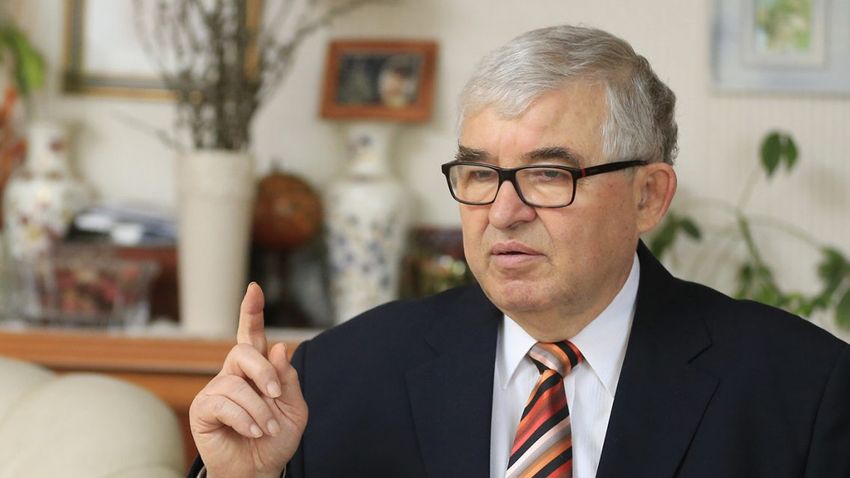My excellent principled friend (LK), who is concerned about the country and the people, in an earlier article published in the newspaper - in which he took the debt under his magnifying glass - also told me that it would be appropriate for me to speak on the matter, since in historical times I was at the very place, in the central bank, where matters were discussed I could see. Although he was not mentioned by name, I recognized him and really felt like I had been found, and I see that the time has come for me to speak. The speech is also very timely, because the current situation is also pushing our country into debt.
The left-liberal and globalist naysayers in Hungary see no difference between the indebtedness of that time (1973–1998 and 2002–2010) and today, even though there is almost only that. They are also struggling with debt. My dear friend spent his time in the Planning Office (OT) from 1973 until the regime change, and I spent my time in the Magyar Nemzeti Bank. It was a very exciting and, to date, frankly unexplored, historical change in the world economy. The great excitement after 1973 was caused by the fact that, from 1945 to 1973, the western half of Europe was flooded with US dollars. Huge fortunes came into the hands of the private money empire - the unknown dollar lords - (international investors, PC-wise) for the "printing ink smell" paper dollars, while the convertibility of money (dollars) into gold was suspended - still "temporarily" - in 1973 by the United States (Nixon). Something had to be done in order to avoid the big scandal for the disclosure of a fraud that can hardly be called noble. The word fraud stands out because the private money empire acquired enormous real wealth for printed paper.
The wealth belongs to the "noble investors, but the American state will have to stand up for the dollars. Remaining practical and wise even at the age of 100, the then US Secretary of State Kissinger went to the oil producers and made a deal with them. Raise the price of crude oil many times over and accept only dollars as payment, the saying went. So it was. The accumulated mountains of dollars from Europe quickly migrated to the Arabs. We were not left out of the "good" either, despite the "official word" that the price increases will stop at Hegyeshalom. They still got in. "There is also a theoretically impeccable answer to the situation: the economy must be modernized so that we can increase dollar-producing Western exports. And for modernization, you need resources, and of course everything that can be purchased for them, which were mainly available in the West at the time, similarly to the additional resources, the necessary money. Therefore, it is necessary to incur debt in order to cover the money needed for the necessary investments, and then to repay the debt easily from the surplus products. Everything went well on paper. My friend followed the process in the OT, and I followed it in the MNB. At that time, the MNB borrowed the money in its own name, and the word was that it would pass it on to the economy to achieve the goals. My insight into the case was because I was in charge of the department that handled servicing (interest payments, repayments, currency conversions) in relation to already taken out loans. Another class, which was made up of carefully selected "excellences", such as András Simor, had his colleagues travel here and there to take out the loans. Using a hospital analogy, they were the "healing" doctors with credit, and we were the pathologists. (Even in hospitals, the pathologist knows the definitive answer to the disease and the necessary therapy, albeit late, but at least in retrospect.)
The years flew by nicely. My friend in the OT made sure that the resources and assets of the economy were in balance, i.e. what we borrow from loans, is also produced from surplus exports over a period of time. This was increasingly not the case. The return (surplus exports) was waiting for itself, and the debt piled up and kept piling up. Previously taken out loans could only be repaid from additional income, but from taking out new loans. He observed several such sudden accumulations of debt, which could not be explained by the fact that the economy had made some large investments to increase exports, while the amount of debt jumped forward greatly. It also concluded that if this continues, the country will be unable to pay the debt, but even in order to pay the ever-increasing interest rates, bread must be taken from the mouths of the people. The first horrendous austerity followed, on July 1, 1979, the price level went up by about 9 percent, and compensation was on a see-and-see basis. It must be said that the public knew nothing about the real facts of the debt, because the data were not public, but they were guarded by a seven-seal lock, the so-called TÜK, i.e. the rules of secret data management. Only a few were given the insight, and those who would have made such data public would become the proud inhabitants of a cell for a few years. In professional circles, however, the grumbling started, but for years it had no effect, what's more, there were dismissals because of it. Even the finance minister at the time, Lajos Faluvégi, was interested. Although the manager did not receive an answer from the MNB, he was pushed to the side and formally promoted, he became the president of the OT, and in addition in the rank of deputy prime minister. Meanwhile, we were also there next to the autopsy table, marveling at everything that happened.
The official central bank communication from the market oracle (Black) was to borrow money at low interest rates. The Swiss franc and yen loans also piled up, and the debt grew nicely. When I brought up yen loans at a meeting and mentioned that the current exchange rate could increase from 220 yen to 150 per dollar, the loan doctors (he immediately became a bank CEO after the system change) called me a financial journalist. The yen became even 100. Huge losses were incurred. An important question is how could the accumulated losses be hidden even from the political leadership? It was veiled only from the uninitiated, with nothing more than thickly false accounting. The MNB was also responsible for setting the exchange rates, so it set what was favorable to it. In other CGST countries, foreign trade banks took out loans and the central bank set the exchange rates. We only had such orbital insidership, that both (taking out loans and setting exchange rates) were carried out by the MNB (in practice, Fekete). Sometimes the deviation from the real market rates was so great that the book showed losses even despite the false rates. This also happened in 1974, when Minister of Finance Faluvégi inquired, I mentioned his fate earlier, he went to OT. (I think he also understood that we are not asking inappropriately, this is the expectation.) We bought the strong mark and schilling for the import from the mostly weakening dollar, and both the profit and the loss arise only from sales.
When Miklós Németh announced that the debt was no longer twenty, but twenty-two billion dollars, I also became very curious about the reasons. We are long past the austerity shocks of 1979. I carefully followed the processes in the balance of payments maintained in the original currencies and exchange rates (striped notebooks) from 1973 to the end of 1988. The result was astonishing. Of the twenty-two billion dollars in total, less than $1.5 billion was the net surplus source of other exchange rate losses and the accumulation of interest. When I unsuspectingly presented this to the first Minister of Finance in the fall of 1990, they even fired me from my job, and created a "case" that was dragged out by the hair and not supported by any evidence. It is true that by then the debt doctors were sitting comfortably in the executive chairs of commercial banks.
This type of debt management by the MNB continued until 1997, and the change in the debt management system was postponed. Cleaning up the accumulated losses in 1997 (what a miracle: during Surányi's presidency) cost twenty-two billion dollars in new public debt (the operation was called the enigmatic debt swap). Péter Bod and Surányi carried out the debt settlement excellently, and Bod also had the pedigree of a great system changer. For all these reasons, it is not an exaggeration at all, but rather the point itself, to mention a conspiratorial practice in relation to indebtedness that lasted even through the regime change, since it is obvious that this was carried out by a narrow, initiated team, the secure background of which was the politicians who later landed in the SZDSZ and the downtown authority , vocal intellectuals assured, many of them presented themselves as radical regime changers. Indebtedness also caused the failure of the first twenty years of the regime change, that is certain.
The facts of the second wave of indebtedness between 2002 and 2010 are not known to me, although I assume that those now masquerading as "democrats" followed the progressive traditions. The revelation would be very timely. You should follow the money path all the way. In carefully covering up the facts until 2010, serious help came again from the West, just think of Almunia, the EU Commissioner for Finance. The crime was committed by Gyurcsány and Bajnai, but the Orbán government has already been punished. (Excessive debt.) Today, the country is increasing its debt again. Even today, the changed foreign economic environment is the reason. Even then, and even today, we can buy far fewer imports for our exports, and in economic terms, our exchange rates are deteriorating. Import prices are eight percent more expensive on average, resulting in a deficit of around seven to eight billion dollars if this happens throughout the year. This has to be replaced with new sources, practically borrowing, as well as what is missing due to the fact that approximately eight billion euros of money due to us is not coming from Brussels. (Almunia is now operating, it does not help, it hinders.) Added to this is the fact that the domestic car industry performs poorly in exports, because the delivery of parts has not yet recovered after the pandemic. This is a serious export loss.
However, debt management has been operating according to new principles for a long time. The previous foreign currency debt of more than fifty percent is now less than twenty percent. We got rid of a lot of crippling exchange rate risk. The central bank is also shrinking from foreign exchange reserves. These increase in value with the deterioration of the forint. Today, a growing share of the debt (about twenty percent) is in reliable hands, with Hungarian households. This used to be a tiny fraction.
Last but not least, the central bank pursues a policy of national interest, which greatly contributes to the success of debt management. We have both seen debt management, but the difference is stark.
Source: Magyar Hírlap
Photo: Hungarian nation












